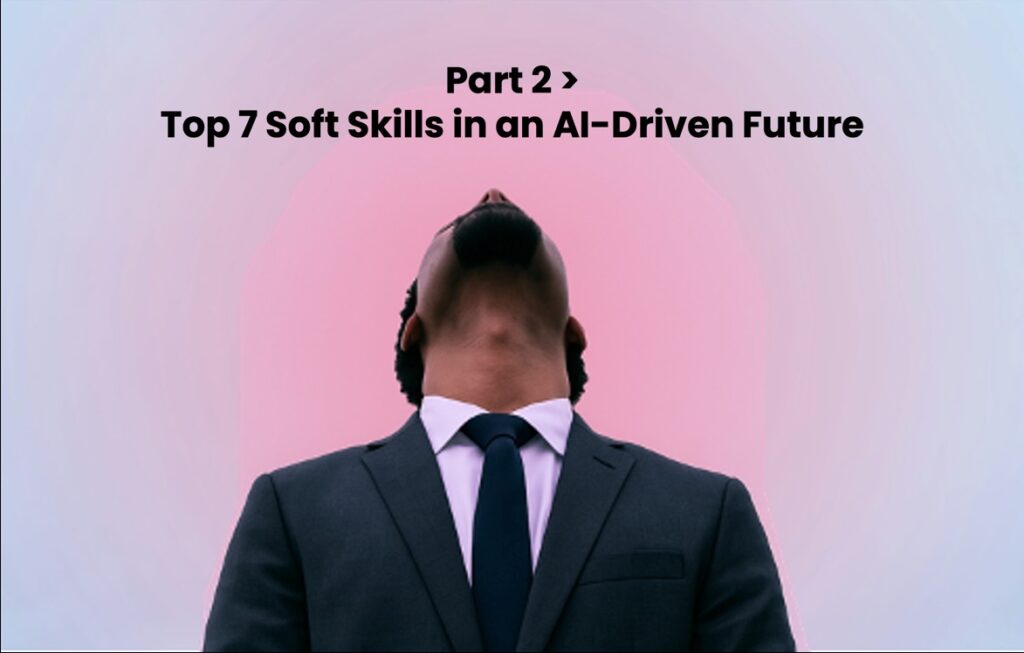
In a digital world where AI handles the admin and automation does the grunt work, it’s the human skills that have become procurement’s hardest currency.
While automation and AI handle the transactional grind, it’s the so-called “soft” skills that are driving real strategic value. This article is Part 1 of a two-part series. Here, we unpack why these human skills have become critical, and why many teams are still underprepared.
Read Part 2: The Top 7 Human Skills for Procurement Professionals
Here’s the problem: while 87% of hiring managers now rank communication, adaptability, and collaboration as critical, most training still focuses on technical know-how.
ERP systems, contract law, compliance, important, yes.
But not what wins hearts, builds alignment, or drives transformation.
That’s where the real gap is.
And it’s not just a training issue, it’s a capability issue.
Because in 2025 and beyond, it’s not what you know that sets you apart. It’s how you connect, adapt, and lead.
Why Soft Skills Are Critical for Procurement Success in 2025
Human Skills Are Now Business-Critical
In procurement, we’ve long talked about technical expertise, category planning, contract law, data analytics, as the foundation of capability. These are often called hard skills because they’re measurable, teachable, and traditionally seen as core to the job. But as the function has evolved, so too has the definition of what makes a great procurement professional.
Enter human skills, sometimes labelled “soft,” though there’s nothing soft about them. We’re talking about communication, adaptability, collaboration, emotional intelligence, and strategic influence. These are the skills that don’t live in a system or spreadsheet. They show up in conversations, stakeholder meetings, supplier negotiations, and moments of tension or change.
And they’re no longer optional.
According to the latest Hays report, a staggering 85–87% of managers now rank these human capabilities as essential to business success.
Why? Because while AI and automation are transforming the technical side of procurement, handling everything from data cleansing to supplier shortlisting, they can’t replicate the relational side. They can’t build trust, navigate ambiguity, or align stakeholders around a complex initiative.
The question isn’t whether AI will replace procurement professionals, it’s whether procurement professionals will develop the human skills AI can’t replicate.
This shift is redefining what it means to lead in procurement. It’s no longer just about savings or compliance. It’s about being a strategic advisor to the business, managing competing priorities, and influencing outcomes without direct authority. That takes more than knowledge, it takes presence, credibility, and emotional intelligence.
So, while bots handle the baseline, human skills have become procurement’s differentiator. They’re not “soft”, they’re just harder to measure, harder to teach, and impossible to automate. And that’s exactly why they matter more than ever.
But understanding why human skills matter is one thing, seeing the real-world impact of neglecting them is another.
Why Soft Skills Are No Longer Optional in Procurement
The Real Cost of Communication Failures and Stakeholder Misalignment
Picture this: the procurement process is watertight. The sourcing strategy is solid, the contract airtight, the supplier vetted and onboarded. But somewhere between the kickoff and the delivery, things go sideways. Why? Misaligned expectations. Radio silence from stakeholders. A supplier misinterpreting the brief. Not a failure of process, just a failure to communicate.
These aren’t edge cases. They’re common, and costly. Underdeveloped soft skills in a procurement function can lead to rework, missed deadlines, supplier tension, and stakeholder disengagement. These are the invisible inefficiencies that never show up on a dashboard but can quietly erode value and credibility.
And it’s not just junior staff.
Across the function, procurement professionals are being called on to lead cross-functional projects, broker alignment, and manage upward, all of which demand influence, not just insight. Soft skills aren’t the icing on the cake; they are the cake when it comes to driving change.
Great procurement isn’t about having the perfect process. It’s about what happens when the process breaks down and you need to rebuild trust.
This matters even more when the stakes are high.
Many CPOs across Australia and New Zealand are leading transformation programs, digitisation, sustainability, supplier diversity, AI integration. But transformation doesn’t succeed on logic alone. It needs trust, buy-in, and belief. That’s why the most effective leaders today aren’t just sharp negotiators, they’re great communicators. They listen, adapt, and bring people with them.
The good news?
These skills are teachable. Influence isn’t magic, it’s method. And for CPOs looking to future-proof their teams, building these capabilities is fast becoming the most strategic move they can make.
Of course, effective training starts with knowing exactly where your team stands today, and that requires more than assumptions.

Procurement Training That Builds Real Capability
From Experiential Learning to Measurable Results
Investing in soft skills isn’t just about professional development, it’s about business capability. At the Academy of Procurement, we’ve designed our training to do more than tick the learning box. Our programs are built to shift behaviours, strengthen teams, and make a measurable difference in how procurement shows up across the organisation.
It starts with experiential learning. We run hands-on workshops focused on the human side of procurement, stakeholder engagement, supplier relationship building, influence without authority, and cross-functional leadership. These sessions are practical and scenario-based, drawing on real-world challenges faced by procurement teams in Australia and New Zealand. Participants don’t just talk about communication, they practise it, receive feedback, and refine their approach in a safe, supportive environment.
For broader capability uplift, our eLearning modules deliver consistent, scalable training across geographies and roles. These aren’t passive slideshows, they’re designed for engagement, reflection, and immediate application. Whether your team is spread across the country or all under one roof, we make it easy to embed critical soft skills across the board.
The benefit?
You’re not just building skills. You’re creating alignment, confidence, and consistency in how your team engages with the business. It means fewer misfires, stronger supplier relationships, and a team that knows how to influence outcomes, not just manage process.
Because at the end of the day, capability isn’t what’s written in a policy. It’s what people do, under pressure, in meetings, with stakeholders. And that’s exactly what we train for.
The most successful procurement leaders don’t just negotiate better deals, they negotiate better relationships.
Closing the Procurement Skills Gap with Data-Driven Training
88% of procurement leaders say they’re reassessing team capabilities in 2025, and with good reason. Between digital transformation, shifting risk profiles, and rising stakeholder expectations, procurement’s role has changed. The challenge? Many teams haven’t caught up. And without visibility into current capability levels, even the most experienced CPOs are making critical talent decisions based on instinct, not insight.
That’s where a structured, data-driven approach changes the game.
From Visibility to Capability: Bridging the Procurement Skills Gap with Tailored Learning
At Comprara, we start by making the invisible visible, through a skills gap analysis grounded in a proven capability framework. We define what “good” looks like for your function, whether that’s stakeholder influence, commercial acumen, or systems thinking. Then we assess your team across those dimensions, functionally, technically, and behaviourally.
The result is a clear view of your strengths, gaps, and untapped potential. Our CapabilityTRAK dashboards let you visualise this data across roles, business units, or maturity levels. Suddenly, you’re not relying on anecdotal performance reviews or gut feel, you’re making confident, evidence-based decisions.
But insights alone don’t shift capability. That’s why we integrate the analysis directly into action through the Academy of Procurement.
We offer tailored capability academies designed to move the needle:
- Experiential workshops to strengthen stakeholder engagement, influence, and collaboration
- Scalable eLearning modules covering technical, commercial, and human skills
- Micro-credentials aligned to your team’s maturity and strategic goals
The hardest skill to teach isn’t category management or contract law, it’s how to influence someone who doesn’t report to you but whose success depends on you.
This isn’t training for training’s sake. It’s targeted uplift with a purpose, helping teams close the gap between current capability and future needs.
Whether you’re looking to accelerate transformation, build internal pipelines, or reduce over-reliance on external hires, the right capability framework, paired with clear diagnostics and targeted learning, is your most strategic lever.
Because building future-fit procurement teams doesn’t start with hiring, it starts with seeing.
Book a Capability Demo – discover what your team’s really capable of.
In a world where data tells us what happened, human skills help us shape what happens next.
The Future of Procurement: Why Human Skills Matter Most
Soft skills aren’t a nice-to-have, they’re now the sharp edge of high-performing procurement teams. As AI and automation handle more of the transactional load, it’s human capability, communication, collaboration, adaptability, that drives influence, alignment, and real strategic value.
The Real Differentiator in Procurement? Human Skills
The gap isn’t always motivation or effort. It’s often capability, and without visibility, you can’t close it. That’s why forward-thinking CPOs are investing in structured capability frameworks, skills gap analysis, and tailored learning pathways that actually move the dial.
Want to see where your team stands?
Book a complimentary Capability Demo
and let us show you how to turn soft skills into strategic advantage.
Book Now >
So yes, the function is changing. And while we’ve long measured capability in terms of cost, compliance, and contracts, the next frontier is human.
In Part 2 of this series, we unpack the seven skills procurement professionals need to thrive in an AI-augmented future, complete with real-world examples and a roadmap for CPOs. Read Part 2: The Top 7 Human Skills for Procurement Professionals.
The Academy of Procurement offers training in communication and facilitation skills, particularly within the context of procurement.
These skills are crucial for procurement professionals to effectively communicate with stakeholders, manage relationships, and achieve business objectives.
Key areas of focus within the Academy’s communication and facilitation training include:
Developing interpersonal skills: This includes active listening, empathy, and understanding non-verbal communication.
Improving communication effectiveness: This covers both verbal and written communication, including the ability to present complex ideas clearly and concisely.
Mastering facilitation skills: This involves leading and guiding discussions, managing group dynamics, and ensuring effective participation.
Building stakeholder relationships: This focuses on developing rapport, understanding stakeholder needs, and managing potential conflicts.
Influencing and negotiation: This area covers techniques for influencing stakeholders, managing objections, and achieving favourable outcomes in negotiations.
Adapting communication styles: Recognizing the importance of tailoring communication to different audiences and situations.
Utilising various communication tools and techniques: This includes understanding the 7 Cs of communication (clear, concise, concrete, correct, coherent, complete, and courteous).
Want Communication Training
for your Procurement Team?
Benefits of developing these skills for procurement professionals:
- Improved stakeholder engagement: Effective communication fosters better relationships and understanding with stakeholders, leading to smoother procurement processes.
- Enhanced negotiation outcomes: Strong communication skills contribute to more favorable sales and transaction outcomes.
- Increased collaboration and teamwork: Clear communication facilitates better teamwork and collaboration within procurement teams and across departments.
- Stronger professional reputation: Procurement professionals with excellent communication skills are often seen as more effective and reliable.
- Reduced conflict and misunderstandings: Clear communication helps to prevent misunderstandings and conflicts, leading to more efficient procurement processes.
- Greater influence and impact: Effective communication allows procurement professionals to better influence decision-making and achieve desired outcomes.
Get Procurement Insights That Matter
Join 10,000+ procurement professionals getting monthly expert cost-optimisation strategies and exclusive resources. Unsubscribe anytime.
Join



